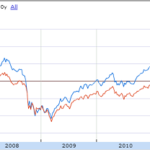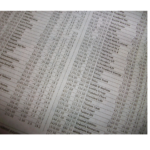Dividend ETFs are beating the S&P500 handily and it appears as though they have the propensity to do so into the foreseeable future. There are some interesting happenings in both the broader market as well as the fixed-income space. Treasuries continue to break new lows leaving investors scratching their heads as to whether we’re truly headed into a a deflationary environment, whether government paper is really THAT much more attractive than risky assets or whether this is the beginning of a bond bubble of epic proportions. Common equities meanwhile have been pretty much range bound with good recent earnings news tempered by continued economic malaise in the US at large and last week, the dreaded Hindenburg Omen reared its ugly head. While there are only a handful of AAA companies left in the world, there are dozens upon dozens of very high quality outfits yielding 3-6% that have adequate cash flow to continue/increase dividend payouts at their current pace, especially in the face of their persistence during the recent financial collapse.
There are some key drivers for this performance and it’s also helpful to look back at the prior decade to take solace in the fact that value stocks actually did fairly well compared to the “lost decade” for the broader market indices.
- Few Income Alternatives – Investors seeking income have very few choices that balance an acceptable yield with liquidity and risk. Savings and money markets are near zero, CDs have penalties and government bonds are at record lows. Even in the corporate bond space, IBM just issued a 1% note recently!
- Future inflation and interest rate hikes? – If and when interest rates finally rise, and if inflation kicks in, that will not bode well for fixed income investments as they lose their buying power in that environment. Dividend stocks can continue to increase their payouts however.
- The Dividend Cuts Have Already Occurred – The only direction seems to be up. Many companies cut their dividends in 2008 and 2009, but now we’re seeing increases and if a company survived the crash only to cut their dividend now, that would certainly leave shareholders scratching their heads. Most cuts have already occurred, so the propensity will be to increase rather than decrease payouts.
- Cash Hoards with Nowhere to Spend it – Companies are sitting on record hoards of cash. On one hand, some may be choosing to hang on to these cash hoards indefinitely so they’re not priced out of credit during another crunch in the future, but short of acquisitions, what are some of these outfits going to do with $10 Billion or more on their balance sheets besides increase dividend payouts. It is likely just a matter of time.
According to JEREMY SIEGEL AND JEREMY SCHWARTZ in this week’s Wall Street Journal Opinion piece,
Those who bought “value” stocks during the tech bubble—stocks with good dividend yields and low price-to-earnings ratios—have done much better. From December 1999 through July 2010, the Russell 3000 Value Index returned 35% cumulatively while the Russell 3000 Index of all stocks still showed a loss.
The spread in performance between Dividend ETFs and the S&P500 (SPY) has been impressive year to date:
(SDY) – SPDR S&P Dividend ETF – up 3.4%
(DVY) – iShares Dow Jones Select Dividend – up 3.3%
(PEY) – PowerShares High Yield Dividend Achievers – up 4.8%
(VIG) – Vanguard Dividend Appreciation ETF – flat 0.0%
vs. SPY at -2.2% (S&P500 ETF), not to mention, these dividend ETFs have higher dividend yields than SPY as well.
Aside from the primary dividend stock ETFs covered above, there are also even higher yields and attractive prospects in Utility Stock ETFs, Preferred Stocks, Master Limited Partnerships, and this REIT List as well.
Disclosure: No position in any ETFs covered in this article.











{ 1 comment… read it below or add one }
Re: Jermy Siegel
Reading Jeremy Siegel’s book “Stocks for the Long Run” right now and plan on doing a book review of it.
Siegel is a perma-bull for stocks forever and always hates bonds. He’s made a number of really bad calls over his career.
Look at this interview in 2007:
http://www.cnbc.com/id/15840232?video=601256693
I’m not saying I disagree with Seigel about a bond bubble, but markets can stay irrational longer than you can stay solvent to bet against it.
{ 1 trackback }